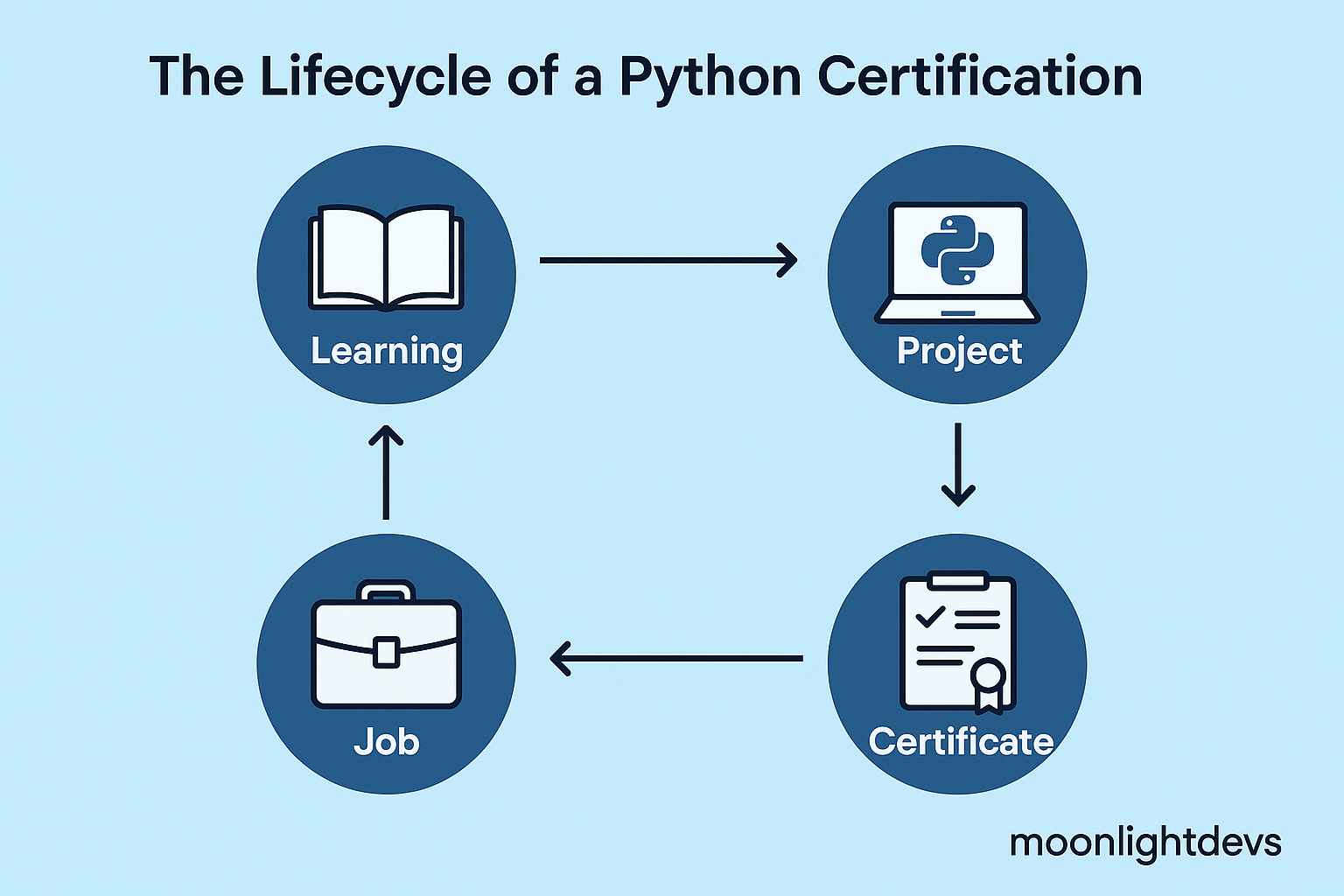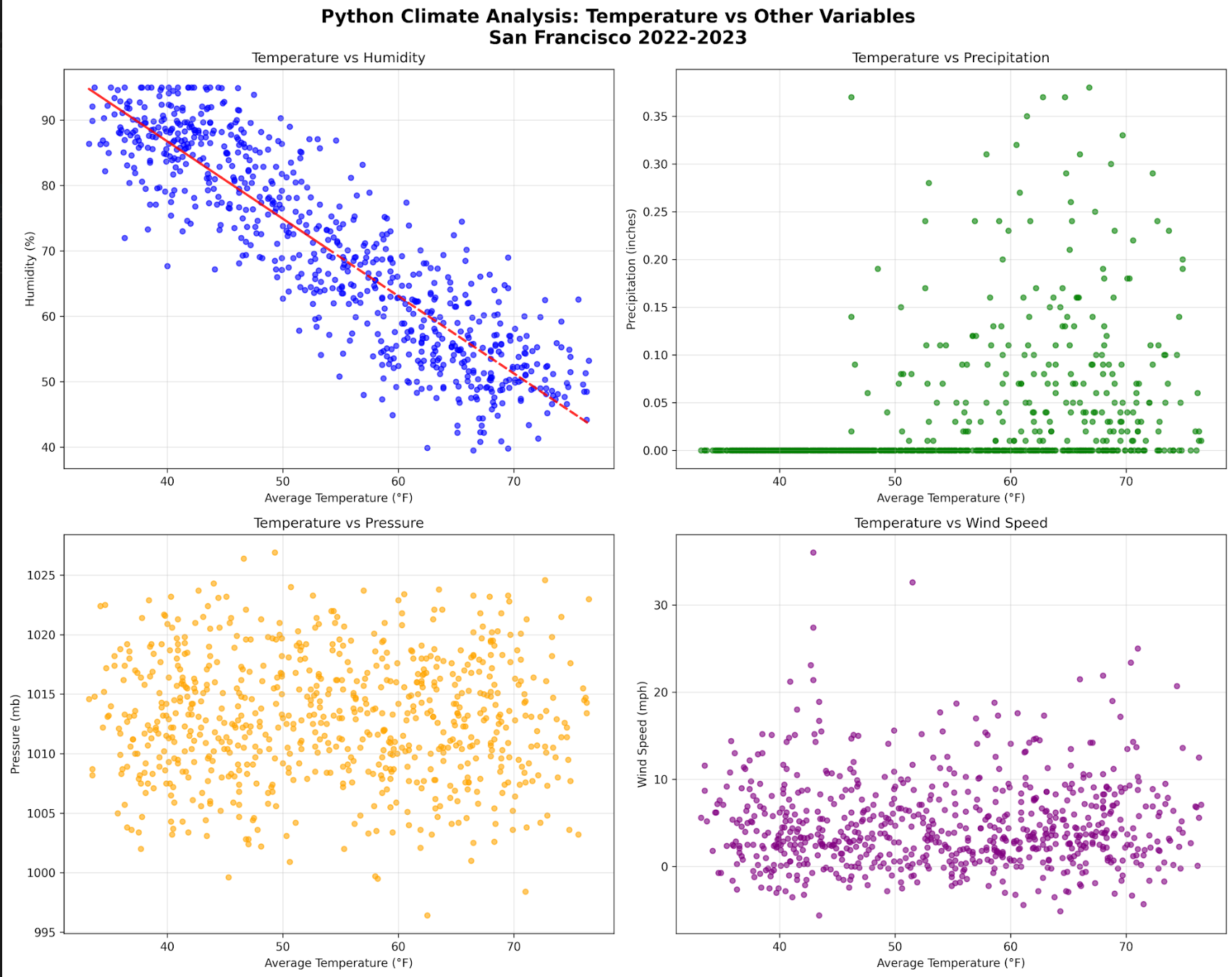
Top 7 Python Certifications for 2026 to Boost Your Career
Python continues to dominate as the most versatile programming language across AI, data science, web development and automation. If you’re aiming for a career upgrade, a pay raise or even your very first developer role, the right Python certification can be a game-changer. In this guide, we’ll explore the top 7 Python certifications for 2026 from platforms like Coursera, Udemy and LinkedIn Learning—an ROI-focused roadmap for students, career switchers and junior devs.
Dev Orbit
October 2, 2025
Why Python Certifications Will Still Matter in 2026
Let’s be honest: the tech job market is competitive. Resumes pile up fast and recruiters often scan for signals of skill. A strong Python certification isn’t just a digital badge—it’s proof you’ve invested in job-ready skills and can apply them in real-world projects.
While experience still outweighs certificates, they do three important things for your career:
Open doors — Many entry-level and junior positions list Python certification as a “preferred qualification.”
Signal seriousness — Employers see certifications as proof of discipline and commitment.
Boost ROI — With the right certificate, you can fast-track into roles like Python Developer, Data Analyst or Machine Learning Engineer, often commanding salaries in the $70k–$120k+ range.
⚠️ Warning: Not all certifications are worth your time or money. Some are outdated or too academic. The real value lies in hands-on learning, industry recognition and career alignment.
This article highlights the seven certifications in 2026 that actually deliver ROI.
The Concept: What Makes a “Good” Python Certification?
Before you invest, it’s critical to define what makes a Python certification worth it. Think of it as buying a tool: not every shiny drill helps you build a strong house.
✅ Key factors of a good Python certification:
Industry recognition — Employers should know the provider (e.g., Google, IBM or Coursera).
Practical projects — Real-world assignments instead of just multiple-choice tests.
Instructor quality — Courses taught by experienced developers, not generic instructors.
Affordability — ROI matters; free or low-cost courses from trusted platforms often beat expensive bootcamps.
Skill depth — Covers fundamentals (syntax, OOP data structures) plus in-demand areas (AI, data science, web).
📌 Insight: The best certifications combine theory + practice. A GitHub portfolio of course projects is often more powerful than the certificate itself.
How Python Certifications Work (Step-by-Step)
Most certifications follow a similar learning journey:
Structured Modules — Weekly lessons on Python basics, libraries and frameworks.
Practice Assignments — Small coding exercises with instant feedback.
Capstone Projects — A real-world project like building a web scraper, an API or a data visualization dashboard.
Assessment/Exam — Multiple-choice or coding challenges that test mastery.
Digital Credential — A certificate you can add to LinkedIn, GitHub, or your resume.

[The Lifecycle of a Python Certification]
💡 Tip: Always download and keep your course projects; they’re resume gold when showcasing your skills.
The Top 7 Python Certifications for 2026
Here’s the ROI-focused list—programs that balance recognition, affordability and career alignment.
1. Google IT Automation with Python (Coursera)
Provider: Google via Coursera
Duration: ~6 months (self-paced)
Focus: Automation, scripting, troubleshooting, Git, APIs
Cost: $39/month (Coursera subscription)
✅ Best For: Beginners aiming for IT, sysadmin, or DevOps roles.
📌 Highlights:
Taught by Google engineers.
Hands-on projects with Git and cloud automation.
Career certificate recognized by Google partners.
⚠️ Caution: It’s IT-focused; if you want data science or AI, look elsewhere.
2. Python for Everybody Specialization (Coursera – University of Michigan)
Provider: University of Michigan
Duration: ~8 months
Focus: Core Python, data access, web scraping, databases
Cost: $39/month
✅ Best For: Absolute beginners who want to go from “zero to hero.”
📌 Highlights:
Instructor Charles Severance (“Dr. Chuck”) is widely respected.
Includes database integration and APIs.
Projects are beginner-friendly but resume-ready.
💡 Pro Tip: Pair this with free projects on GitHub to showcase applied skills.
3. Complete Python Bootcamp: From Zero to Hero (Udemy)
Provider: Udemy
Duration: 60+ hours of video
Focus: Python fundamentals, OOP, advanced concepts, GUI apps
Cost: ~$14.99 (frequent Udemy sales)
✅ Best For: Self-learners who want depth at a budget price.
📌 Highlights:
Lifetime access, one-time payment.
Covers Python 3.10+ features.
Strong community + Q&A support.
⚠️ Warning: No formal “recognized” certificate compared to Coursera/edX.
4. IBM Data Science Professional Certificate (Coursera)
Provider: IBM
Duration: 10 courses (~11 months)
Focus: Python, data analysis, ML basics, Jupyter, SQL
Cost: $39/month
✅ Best For: Career switchers targeting data science roles.
📌 Highlights:
IBM-branded credential.
Real-world datasets and labs.
Prepares you for entry-level data analyst/science roles.
💡 Pro Tip: Leverage IBM’s GitHub repos included in the program to expand your portfolio.
5. Python Essential Training (LinkedIn Learning)
Provider: LinkedIn Learning
Duration: ~6 hours
Focus: Core syntax, OOP, file handling, error handling
Cost: $29.99/month (first month free)
✅ Best For: Professionals adding Python to an existing skill set.
📌 Highlights:
Short, digestible format.
Certificate integrates directly into LinkedIn profile.
Solid for business/data automation use cases.
⚠️ Warning: Not deep enough for full-time developer roles. Use it as a starter.
6. Professional Certificate in Python Programming (edX – MIT xPro)
Provider: MIT xPro via edX
Duration: 16–20 weeks
Focus: Core programming, algorithms, testing, performance
Cost: ~$1,500 (premium option)
✅ Best For: Students seeking a prestigious credential.
📌 Highlights:
MIT brand recognition.
Instructor-led with graded projects.
Covers software engineering rigor, not just syntax.
⚠️ Caution: Expensive—ROI only makes sense if you want the brand prestige.
7. Microsoft Python Certification (Microsoft Learn + Pearson VUE Exam)
Provider: Microsoft
Duration: Self-paced prep + exam
Focus: Python fundamentals, scripting, data structures
Cost: $99 exam fee
✅ Best For: Developers looking for a recognized vendor certification.
📌 Highlights:
Proctored exam = higher credibility.
Directly maps to Microsoft’s ecosystem.
Widely respected across enterprises.
⚠️ Warning: The exam is tough if you don’t practice coding regularly.
Real-World Use Case: From Certificate to Job Offer
Imagine Riya, a junior QA tester wanting to switch into automation. She took the Google IT Automation with Python certification, built a few small automation projects (log analyzers, deployment scripts) and showcased them on GitHub. Within 6 months, she landed a DevOps role with a 40% salary bump.
💡 Takeaway: Certifications are just the start—what you build with the knowledge is what employers value most.
Bonus: Advanced Tips to Maximize ROI from Python Certifications
✅ Build a GitHub Portfolio — Don’t just complete projects; push them to GitHub with proper README files.
✅ Add Certificates to LinkedIn — Recruiters actively search by certifications.
✅ Combine with Internships/Freelance Gigs — Apply skills to small projects to gain confidence.
✅ Don’t Stop at Python — Pair with SQL, cloud (AWS/GCP), or ML to become job-ready.
⚠️ Avoid Pitfalls:
Don’t collect random certificates just to stack them. Focus on one career-aligned path.
Be wary of “certificate mills” with no hands-on projects.
Conclusion: Which Python Certification Should You Choose?
If you’re a student or beginner: start with Python for Everybody (Coursera).
If you’re a career switcher into data science: go with IBM Data Science Certificate.
If you’re an IT professional moving into automation: Google IT Automation with Python is your best bet.
If you want brand prestige: choose MIT xPro or Microsoft Certification.
In 2026, Python certifications remain one of the fastest ROI tools for career growth—but only when paired with real-world practice and a clear career goal.
📌 Action Step: Pick one certification aligned with your path, complete it and immediately build 2–3 small projects for GitHub. That’s how you turn a certificate into a career launchpad.
👉 Subscribe now to stay updated on the latest Python career trends and new certification launches.

Enjoyed this article?
Subscribe to our newsletter and never miss out on new articles and updates.
More from Dev Orbit

How to Write an Essay Using PerfectEssayWriter.ai
Have you ever stared at a blank page, overwhelmed by the thought of writing an essay? You're not alone. Many students and professionals feel the anxiety that accompanies essay writing. However, with the advancements in AI technology, tools like PerfectEssayWriter.ai can transform your writing experience. This article delves into how you can leverage this tool to produce high-quality essays efficiently, streamline your writing process, and boost your confidence. Whether you're a student, a professional, or simply someone looking to improve your writing skills, this guide has you covered.

A Beginner’s Guide to AWS EC2 and AWS Lambda: When and Why to Use Them
Confused between EC2 and Lambda? This beginner-friendly guide breaks down their core differences, use cases, pros and cons and helps you choose the right service for your application needs.

🚀 Mastering Python Automation in 2025: Deep Insights, Real-World Use Cases & Secure Best Practices
Streamline your workflows, eliminate manual overhead and secure your automation pipelines with Python — the most powerful tool in your 2025 toolkit.

Are AIs Becoming the New Clickbait?
In a world where online attention is gold, the battle for clicks has transformed dramatically. As artificial intelligence continues to evolve, questions arise about its influence on content creation and management. Are AIs just the modern-day clickbait artists, crafting headlines that lure us in without delivering genuine value? In this article, we delve into the fascinating relationship between AI and clickbait, exploring how advanced technologies like GPT-5 shape engagement strategies, redefine digital marketing, and what it means for consumers and content creators alike.

How to Build an App Like SpicyChat AI: A Complete Video Chat Platform Guide
Are you intrigued by the concept of creating your own video chat platform like SpicyChat AI? In this comprehensive guide, we will walk you through the essentials of building a robust app that not only facilitates seamless video communication but also leverages cutting-edge technology such as artificial intelligence. By the end of this post, you'll have a clear roadmap to make your video chat application a reality, incorporating intriguing features that enhance user experience.

Stop Writing Try/Catch Like This in Node.js
Why Overusing Try/Catch Blocks in Node.js Can Wreck Your Debugging, Performance, and Sanity — And What to Do Instead
Releted Blogs

Python vs R vs SQL: Choosing Your Climate Data Stack
Delve into the intricacies of data analysis within climate science by exploring the comparative strengths of Python, R and SQL. This article will guide you through selecting the right tools for your climate data needs, ensuring efficient handling of complex datasets.

9 Real-World Python Fixes That Instantly Made My Scripts Production-Ready
In this article, we explore essential Python fixes and improvements that enhance script stability and performance, making them fit for production use. Learn how these practical insights can help streamline your workflows and deliver reliable applications.

MongoDB Insights in 2025: Unlock Powerful Data Analysis and Secure Your Database from Injection Attacks
MongoDB powers modern backend applications with flexibility and scalability, but growing data complexity demands better monitoring and security. MongoDB Insights tools provide critical visibility into query performance and help safeguard against injection attacks. This guide explores how to leverage these features for optimized, secure Python backends in 2025.

Data Validation in Machine Learning Pipelines: Catching Bad Data Before It Breaks Your Model
In the rapidly evolving landscape of machine learning, ensuring data quality is paramount. Data validation acts as a safeguard, helping data scientists and engineers catch errors before they compromise model performance. This article delves into the importance of data validation, various techniques to implement it, and best practices for creating robust machine learning pipelines. We will explore real-world case studies, industry trends, and practical advice to enhance your understanding and implementation of data validation.

Best Cloud Hosting for Python Developers in 2025 (AWS vs GCP vs DigitalOcean)
Finding the Right Python Cloud Hosting in 2025 — Without the Headaches Choosing cloud hosting as a Python developer in 2025 is no longer just about uptime or bandwidth. It’s about developer experience, cost efficiency and scaling with minimal friction. In this guide, we’ll break down the top options — AWS, GCP and DigitalOcean — and help you make an informed choice for your projects.
Have a story to tell?
Join our community of writers and share your insights with the world.
Start Writing